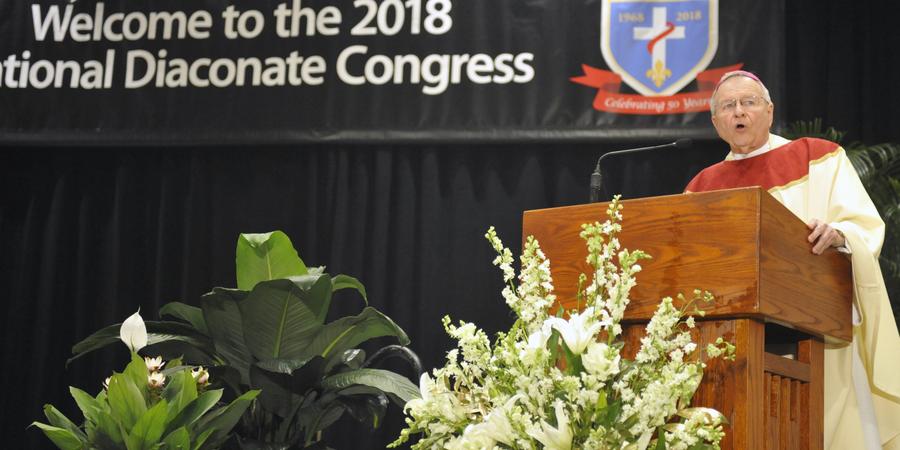Five years duration is now typical for diaconal formation
Diaconate in US
Beginnings and Growth
When the US Bishops received approval in 1968 to inaugurate the diaconate and in 1971 issued their first guidelines for diaconal formation, few could have imagined that a half-century later there would be over 18,000 men in the diaconal order—about 40% of those world over. Based on the bold, brave, and invariably generous response of those first men (and their wives), there is now diaconal presence in nearly all the US’ 196 dioceses; all but about 30 have active formation programs. Deacons now include those who support themselves through secular occupation, those in compensated ecclesial positions (either full or part-time), and, increasingly, those retired from secular work who now dedicate untold hours to volunteer ministry.
A threshold in our history came in 2005 with the US bishops’ promulgation of the National Directory for the Formation, Life and Ministry of Permanent Deacons based on the Church’s 1998 universal norms. The National Directory brought clarity, shared expectations, and normativity to sincere but sometimes disjunct approaches to diaconal formation. Five years duration (including the aspirancy or propaedeutic year) is now typical for diaconal formation. With its emphasis on the integrated three-fold ministry of the Word as Foundation, of the Eucharist as Font / Heart, and of Divine Charity as abiding Fruit, the Directory also fostered an ongoing engagement with a richer theology of diaconate. The deacon’s service of charity is rooted in, enriches, and returns to his prior service to the Word and immolated Deacon, Jesus.
Depending on available resources and geographic size of the diocese, a variety of formation models has developed: cohorts every five or six years versus annual or biennial admissions, weekend formation retreats or “seminary” model with weekly sessions (or some combination), degree-conferring or non-degree, both informal and formally developed post-ordination formation, both parish and non-parochial internships, conjoint with seminarians and /or lay ecclesial formation, and all variety of mentoring, modelling, distance-learning, classroom, in-the-field, and communal and individual formation. Formation is likewise tailored to the broad spectrum of ministerial settings (rural, suburban, urban, maritime) and a variety of approaches to the use of deacons (always assigned to a home parish, never assigned to a home parish, formally assigned to non-parish or diocesan-wide ministry).
Nationally, the diaconate is served by the US Bishops’ Committee on Clergy, Vocations, and Consecrated Life, by the National Association of Diaconate Directors (NADD) and several other national deacon associations, by the NADD’s biennial National Directors’ Institute (focusing on best practices in formation) and Ministry and Life Institute (focusing on post-ordination practices), and by two publications: The Deacon and the more academic Josephinum Diaconal Review.
Over 3000 deacons and family (including IDC representatives!) participated in the 2018 National Diaconate Congress in New Orleans in recognition of God’s abundant blessing.
Some Challenges
- An overall aging of the diaconate coupled with demographic trends of younger men delaying educational, career, and vocational decisions.
- Forming and caring for increasing number of life-long celibate men, widower deacons, and widows.
- Providing adequate formation in more remote or less wealthy dioceses.
- Fostering vocations among Native American, African-American, Hispanic, and Asian communities.
- Fostering a mature understanding of diaconate among the presbyterate.
- Avoiding the reduction of the deacon either to “the social justice guy” (social worker) or to “Father’s sacramental helper guy” (mini-priest) and avoiding the misinterpretation of “service” simply as practical activity.
- Addressing deacon candidates’ often vitiated experience of fatherhood that undermines their own personal and spiritual identity—and undermines eventual diaconal service.
Some Opportunities
- Rediscovering the primacy of the interior life and of worship from which all ministry vibrantly flows.
- Recognizing that “the poor” in America are too often those who are materially well-off, even fabulously wealthy, but are crushingly alone and bereft of meaning, purpose, and the experience of unconditional love.
- Imaginatively and strategically using deacons as “the bishop’s man” for ministry beyond the parish—and, secondarily, thereby increasing vocational awareness.
- Integrating and harmonizing (more even than balancing) holy orders, marriage, family, work, community—and thereby contributing to the renewal of sacramental marriage and family, the building blocks of any society.
- Deacons bringing skills and experience from the secular arena to bear in significant roles in diocesan structures.
- Fostering diaconal presence in those liminal spaces: the worlds of business, education, cultural renewal, environmental concern.
- Especially pertinent in America (and my home archdiocese, St. Paul & Minneapolis!): bringing the salve of mercy and charity to bear on deep racial, political, ideological, and economic divisions.
- Imaginatively reaching two of the most marginalized demographic groups in America: men and youth (who both populate the ranks of the “nones”).
And, please God, in the midst of the therapeutic, consumerist, emotivist, neo-gnostic & non-incarnational, relativistic spiritual and moral imagination of our prevailing culture, fulfilling the role of St Stephen, “model of the New Evangelization” (Benedict XVI), inviting all in their pain and woundedness to that encounter with Jesus Christ, the answer to the question that is every human life.
Deacon Joseph Michalak | Director, Institute for Diaconate Formation
The Seminaries of Saint Paul — Joyful Catholic Leaders


